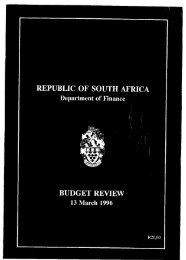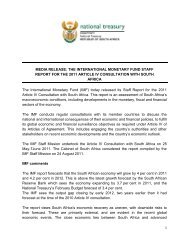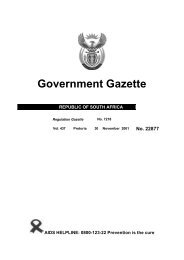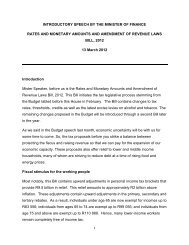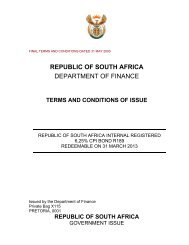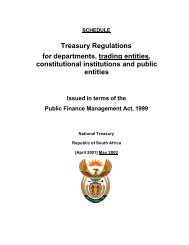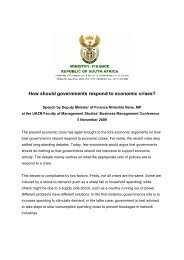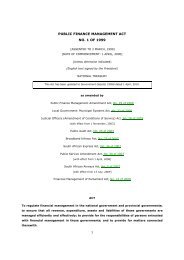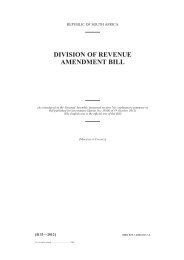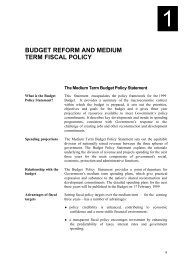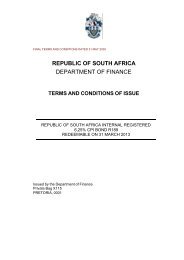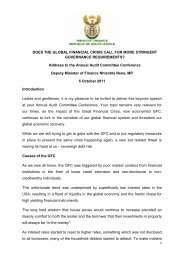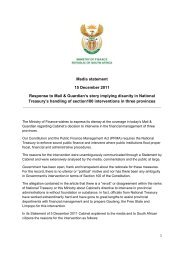1998 SOUTHERN AFRICA ECONOMIC ... - National Treasury
1998 SOUTHERN AFRICA ECONOMIC ... - National Treasury
1998 SOUTHERN AFRICA ECONOMIC ... - National Treasury
You also want an ePaper? Increase the reach of your titles
YUMPU automatically turns print PDFs into web optimized ePapers that Google loves.
c u rre n t ly exists in SADC governments is supported by sound<br />
economic management. In this context while the argument is<br />
dominated by trade liberalisation there is a realisation that nontariff<br />
barriers affect trade, p roduction and inve s t m e n t . T h e<br />
Ministers of Trade and Industry are mainly concerned with the<br />
first two barr i e r s .The Ministers of Finance on the other hand<br />
a re more concerned with ensuring that the gains from macro -<br />
economic re forms which counties have been undert a k i n g<br />
i n d i v i d u a l ly are regionalised by varying the intensity, scope and<br />
sequencing of economic policies.<br />
H owever the Sector has had considerable difficulties in<br />
understanding the nature of the problems because of lack of an<br />
adequate database on which to base the analy s i s . In 1996 the<br />
Committee of Governors ap p roved a project on the<br />
d evelopment of a statistical database with economic and<br />
financial info r m a t i o n . A re p o rt “Statistical tables and graphs fo r<br />
SADC countries” is produced bi-annu a l ly for presentation to<br />
the meeting of SADC Central Bank Gove r n o r s . The ap p rove d<br />
statistics appearing in this re p o rt are now available on In t e r n e t ,<br />
a dd re s s : w w w. s a d c b a n ke r s . o r g . The developments in the<br />
statistical data base are discussed by senior officials from the<br />
central banks’ Departments of Research and Economics. T h e<br />
latest development concerns the proposed inclusion of fiscal<br />
statistics to show the sources of government income and<br />
distribution of government expenditure.<br />
The statistics project is part of the Sector’s effo rts in the<br />
d evelopment of public confidence and information efficiency. I t<br />
has not been possible in the past to tackle governance issues<br />
because the information base was ve ry narrow. T h e<br />
i m p rovements in the database will ensure that the sector<br />
e f fe c t i ve ly deals with macro-economic convergence issues and<br />
a c c o rd i n g ly adopts measurable indicators for conve r g e n c e<br />
c r i t e r i a .<br />
An improvement in the management of SADC economies has<br />
been characterised by the re m oval of exchange controls as part<br />
of economic re fo r m .H oweve r, the speed and effe c t i veness of<br />
relaxation of exchange controls have not been assessed<br />
re g i o n a l ly. The governors adopted a project looking at a<br />
t h e o retical study on the macro-economic and re g u l a t o ry<br />
f r a m ework that should accompany the liberalisation of<br />
exchange contro l s . The study noted that most SADC<br />
economies have already liberalised exchange controls on cert a i n<br />
c a t e gories of the current account, such as other export s ,<br />
i m p o rt s , s e rvices and income. A first objective for SADC<br />
economies should be to adopt A rticle VIII of the IMF’s A rt i c l e s<br />
of A g re e m e n t .Once this has been attained, f u rther relaxation on<br />
the capital account are called fo r. G i ven the need for fo re i g n<br />
i nvestment in SADC countries it was recommended to<br />
Ministers that obstacles hindering inward financial flows should<br />
be re c o n s i d e re d ,e s p e c i a l ly control restrictions on inward dire c t<br />
i nve s t m e n t ,equity and port folio inve s t m e n t .<br />
The consistency of the above conclusions we re echoed by the<br />
Committee of Stock Exchanges in their recommendations to<br />
Ministers on harmonisation of economic activities with<br />
re fe rence to movement of capital flow s . South Africa acted on<br />
these re c o m m e n d a t i o n s .The <strong>1998</strong>/99 South African budget has<br />
a l l owed a further relaxation of capital flows within SADC fro m<br />
a limit of ZAR50 million to ZAR250 million. L i kew i s e<br />
institutional investors can now increase their fo reign curre n c y<br />
t r a n s fers from 2 percent to 10 percent of their previous ye a r ’s<br />
net inflow of funds.<br />
The developments in SADC are happening in the context of<br />
g l o b a l i s a t i o n ,as a result of the expansion of internationally -<br />
d r i ven economic changes. It has thus been deemed useful to<br />
include cooperation in international negotiations with the<br />
multilateral institutions, e s p e c i a l ly in the development of<br />
Multilateral Investment A g re e m e n t s ,in the discussions of the<br />
Ministers of Finance. At present this debate is not we l l<br />
a rticulated but it is clear that in the process of re-orientation of<br />
the development strategy from a national strategy to a re g i o n a l<br />
o n e, it would be re l evant to assess the possibility of<br />
s t rengthening the bargaining power of member countries. T h e<br />
concern is that as developments are instituted by the Wo r l d<br />
Trade Organisation (WTO ) , the Organisation for Economic<br />
Co-operation and Development (OECD) and the United<br />
Nations Confe rence on Trade and Development (UNCTA D ) ,i t<br />
is almost impossible for developing countries to single-handedly<br />
p o s i t i ve ly influence the outcomes for themselve s . Instead of<br />
waiting to respond to events once they are final it is perc e i ve d<br />
that SADC Finance Ministers should collaborate with their<br />
trade counterparts for the fo r mulation of a coherent strategy<br />
on multilateral investment agreements for the benefit of the<br />
re g i o n .It is envisaged that the issues arising out of this debate<br />
will be codified to form a significant section of the pro p o s e d<br />
Finance and Investment pro t o c o l .<br />
I I . FINANCIAL MANAG E M E N T<br />
Multilateral institutions have alw ays emphasised the import a n c e<br />
of good governance in any developing country. This in many<br />
instances has been used as a criteria for evaluating the level of<br />
d evelopment finance flows that the developing countries get. I N<br />
as much as good governance is part of the debate in Southern<br />
A f r i c a , the SADC Ministers of Finance decided that financial<br />
management as a theme would be one of the crucial areas that<br />
SADC would be evaluated upon.A c c o rd i n g ly a programme that<br />
a dd ress this theme have been adopted. At the core of this<br />
p rogramme is an attempt to add ress national problems in a way<br />
that simu l t a n e o u s ly add resses regional needs.<br />
Together with organisations, i n s t i t u t i o n s ,and associations at<br />
international and regional leve l , the Finance and Inve s t m e n t<br />
Sector Co-ordinating Unit (FISCU) is invo l ved in devising a<br />
s t r a t e gy to add ress accounting and auditing matters within the<br />
SADC re g i o n .Among the regional bodies invo l ved are the East<br />
and Southern African Association of Accountants- General<br />
( E S A AG ) ,the Eastern, Central and Southern African Fe d e r a t i o n<br />
of Accountants (ECSAFA ) , the Southern African Deve l o p m e n t<br />
C o m munity Organisation of Supreme Audit Institutions<br />
( S A D C O S A I ) .The World Bank and the Canadian International<br />
D evelopment Agency are the two international partners whose<br />
assistance has been sought to fund the activities of these<br />
o r g a n i s a t i o n s .<br />
At the core of the financial management agenda is the desire to<br />
bring about harmonisation of the accountancy and auditing<br />
p ro fessions on a regional basis.<br />
The scope of the issues to be cove red in this programme cove r s<br />
a c c o u n t i n g , a u d i t i n g , government accountability, ethics and<br />
norms of the pro fe s s i o n , m e rcantile law, and education and<br />
training of pro fessionals in the accounting and auditing fields. I t<br />
would be a futile exe rcise if SADC we re to attempt to conduct<br />
this work independent of the developments in the pro fe s s i o n s<br />
world wide. For this reason the associations have had to be<br />
c o nversant with developments on improved financial re p o rt i n g<br />
based on the adoption of international accounting and auditing<br />
s t a n d a rds as pro mulgated by the International Federation of<br />
Accountants (IFAC) and the International Accounting and<br />
S t a n d a rds Committee (IASC). E f fo rts by the governments within<br />
SADC to improve accountability and there by prov i d e<br />
responsible control of government finances will have the add e d<br />
benefit of increasing investor confidence while complying with<br />
international standard s . F u rt h e r m o re ; with the inclusion of<br />
Auditors-Generals in this initiative, c a re will be placed on<br />
s t rengthening their powers to enfo rce accountability and<br />
c o m p l i a n c e. While it is generally unquestioned in the private<br />
sector that internal audit is a management tool that ensure s<br />
good corporate gove r n a n c e, in the public sector the idea has<br />
still to be fully marke t e d .It is hoped that the commitment of the<br />
Auditors-Generals to this programme will re i n fo rce the<br />
10



